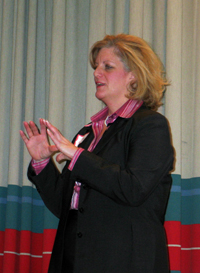 |
Lauren Hill, director of Policy Research for Nebraska Gov. Dave Heineman, addresses the UNMC Delegates on Friday. |
She’s seen a multitude of policies enacted over the years, but Friday praised the state’s ongoing use of tobacco settlement funds as “landmark legislation.”
Hill, who also serves as director of the Nebraska Energy Office, made her comments Friday as the guest speaker for the UNMC Delegates program, which is coordinated through UNMC’s Government Relations office and gives medical center supporters an opportunity to advocate on behalf of the medical center to federal and state representatives.
In his introduction, Bob Bartee, vice chancellor for external affairs at UNMC, described Hill as a dedicated and trusted public servant whose advice is sought widely.
“Lauren is one of the brightest and most influential players in formulating and implementing state public policy,” Bartee said.
While she prefers to stay behind-the-scenes, Hill stepped onto the Eppley Science Hall Auditorium stage Friday to share her insight into state government with 45 members of the UNMC Delegates program.
“I do have a lot of passion for public policy work,” Hill said. “The Office of Policy Research deals with policies that affect people’s lives and people’s check books.”
Bartee praised Hill for her role in shaping legislation that directs tobacco settlement funds for biomedical research to Nebraska’s leading research institutions.
In 2001, the Nebraska Legislature approved legislative bill 692 — also known as the Tobacco Settlement Biomedical Research Initiative — which allocated $10 million annually to the state’s four biomedical research institutions (UNMC, the University of Nebraska-Lincoln, Creighton University and Boys Town).
That annual allocation has increased to $14 million with UNMC receiving about half the funds.
“That amount equates to a $140 million endowment,” Bartee said.
Hill referred to the state’s public policy commitment to use the settlement for health care as “landmark legislation” and noted that some states chose to use the funds for non-health care uses such as building roads or resolving budget deficits.
The decision, however, to direct the funds to biomedical research was not without debate, she said. Even after policy makers had decided to use the money on health care, there was a “collaborative consensus process” to determine which health care interests would benefit, she said.
|
“Lauren is one of the brightest and most influential players in formulating and implementing state public policy.”
|
On Friday, Hill also gave an overview of the structure of state government, including its 22 agencies, which are subject to the governor’s direct control; 52 other agencies, which are not subject to the governor’s direct control; and more than 200 state boards, commissions and task forces.
As director of the Governor’s Policy Research Office, Hill leads a team of eight, including five policy advisers who specialize in different areas, in her office in the state Capitol.
She works regularly with agency directors and state senators to coordinate policy issues ranging from taxes and corrections to education and roads.
She also directs the Nebraska Energy Office, which has 18 employees. The office, which monitors and advocates on energy related issues, lately has been monitoring fuel prices, advocating for the development of renewable energy alternatives, such as wind power, and been involved with policies related to the state’s ethanol production, which ranks second in the nation.
A psychology/political science graduate from Stephens College in Columbia, Mo., Hill earned her law degree from the University of Nebraska College of Law in 1992. She began serving as director of policy research under former Gov. Mike Johanns and previously served as an assistant state attorney general to Don Stenberg.
Hill, whose presentation at the medical center was part of the UNMC Delegates-only quarterly events, encouraged delegates to contact their elected state senator with ideas they want to see translated into public policy. Beyond just saying “there ought to be a law,” Hill also encourages citizens to “be well organized and compelling” in pitching potential ideas to lawmakers.